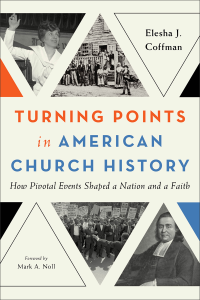 Summary: An introduction to American Church history.
Summary: An introduction to American Church history.
Mark Noll originally released his book Turning Points in Church History in 2001. (It is now in its 14th edition.) Elesha Coffman is writing a United States-focused version with the consent (and introduction) of Mark Noll. Noll is approaching 80 and still has the third in his history of the use of scripture series and several other books he is working on, and he says in the introduction that he didn’t have the time or interest to do an American-focused turning points book.
As with any type of book like this, the choices of what are the turning points matter and will be debated. I think that this choices were good. She started with the Spanish Armada, which she framed as a starting point for English colonialism and a shift in global power. I might have started with the rise of Puritanism or the English Reformation, but all three of those starting points are related and led toward the English colonies in North America.
Coffman did a very good job contextualizing the different turning points. In this type of book, the turning points are a frame for looking at an era of history not just the thing itself. So Azusa Street Revival was not just about that event, but about the rise of the Pentecostal and Charismatic movements in the US and how they rippled through not just those denominations but also impacted Catholic and Episcopal charismatic reform movements as well.
She pays appropriate attention to women and minority Christian communities not just in discussion of the Black Church in chapter five (the founding of the first African American church at Silver Bluff) or the 16th Street Baptist Church bombing and the civil rights movement in chapter 12, but in all of the chapters. One of my complaints would be that I would have liked a chapter on the women’s rights movement. I probably would have chosen Sojourner Truth’s Aint’ I a Woman speech as the framing device, but there are several appropriate alternatives.
I am also glad that she includes a chapter on Catholicism. Again, there always could be more. The problem with introductory survey books is limiting. I had a working knowledge of all of the areas, but I still learned something in every chapter. I think the “Muscular Missions” chapter on the student volunteer movement was well done and appropriately critical of the sexism and bias of the movement while speaking well of the positive intent of evangelism. I would have liked more discussion of how dispensationalism influenced much of that movement, but again, I know not everything can be included.
One last regret, again, I don’t think there was anything that should not have been included that was, but a discussion of the apocalyptic predictions of the end of the world with the Millerites I think was important. It was similarly placed with many new religious movements like the Mormons and the Christian Scientists and the Seventh Day Adventists and Shakers would have also been a helpful addition, but there already were 13 chapters those editorial decisions are hard.
I listened to this as an audiobook. It was something that I could dip in and out of so I spent a couple of months listening to a chapter here and there. I think mostly it was designed as a textbook, but this is very readable and especially if you do not have a lot of American church history, this is a very good place to start.
Turning Points in American Church History: How Pivotal Events Shaped a Nation and a Faith by Elesha Coffman Purchase Links: Paperback, Kindle Edition, Audible.com Audiobook